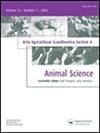猪肉中苍白、柔软和渗出(PSE)样带的综述:当前对潜在因素的认识和对进一步研究的知识空白的识别
IF 0.9
4区 农林科学
Q3 AGRICULTURE, DAIRY & ANIMAL SCIENCE
Acta Agriculturae Scandinavica Section A-Animal Science
Pub Date : 2023-11-14
DOI:10.1080/09064702.2023.2279079
引用次数: 0
摘要
这篇综述探讨了猪肉中苍白、柔软和渗出(PSE)样区域的多因素问题,导致有价值的切割损失。增加屠宰重量,次优冷却制度,屠宰后pH值和温度对糖酵解和蛋白质变性的影响似乎是与保水和颜色属性相关的重要因素。RYR1基因上的n等位基因和PRKAG3基因上的RN -等位基因的存在和表达增加了PSE的发病率。有关损伤肌肉组织特征的研究表明,氧化应激和凋亡过程与“pse样区”的进展有关。经典PSE肉与PSE样带在组织学和生物学上有许多相似之处,特别是在蛋白质特征上,但在将PSE样带限制在半膜肌深部的潜在生理机制上存在差异。开发早期检测方法、高效胴体处理、绘制潜在生理机制和确定遗传背景是未来消除pse样区和提高猪肉品质的重要措施。本文章由计算机程序翻译,如有差异,请以英文原文为准。
A review on pale, soft, and exudative (PSE)-like zones in pork: current knowledge on underlying factors and identification of knowledge gaps for further research
This review examines the multi-factor problem of pale, soft, and exudative (PSE)-like zones in pork causing slicing losses in valuable cuts. Increasing slaughter weight, suboptimal chilling regime, effects of post-slaughter pH and temperature on glycolysis, and protein denaturation seem to be important factors connected to water-holding and colour attributes. The presence and expression of the n allele on the RYR1 gene and the RN – allele on the PRKAG3 gene increase PSE incidence. Studies involving tissue characterization of destructured muscles have associated oxidative stress and apoptotic processes with the progression of ‘PSE-like zones’. Classical PSE meat shows many histological and biological similarities with PSE-like zones, particularly in protein characteristics, but there are differences in underlying physiological mechanisms limiting PSE-like zones to deep semimembranosus muscles. Developing early detection methods, efficient carcass handling, mapping underlying physiological mechanisms, and determining genetic background are important future measures to eliminate PSE-like zones and improve pork quality.
求助全文
通过发布文献求助,成功后即可免费获取论文全文。
去求助
来源期刊

Acta Agriculturae Scandinavica Section A-Animal Science
农林科学-奶制品与动物科学
CiteScore
2.30
自引率
0.00%
发文量
9
审稿时长
>36 weeks
期刊介绍:
Acta Agriculturæ Scandinavica, Section A – Animal Science publishes results of original research in animal science and their applications related to the following topics:
-Animal breeding and genetics
-Molecular genetics
-Animal physiology and reproduction
-Nutrition and feeding
-Animal behaviour and welfare
-General animal husbandry and systems of production, including economic and technical aspects
-Hygiene and quality of animal products
In addition to original articles, covering basic as well as applied subjects, the journal features review articles and short communications.
Acta Agriculturæ Scandinavica, Section A – Animal Science forms part of a trilogy of titles published on behalf of the Nordic Association of Agricultural Scientists (NJF). The series also includes Section B - Soil & Plant Science and the recently launched Section C - Food Economics .
Acta Agriculturae Scandinavica A, B and C are available to purchase as a combined subscription. This provides access to all three journals in the series, and is available to institutional subscribers only. For full pricing information, please view the Taylor & Francis Journals Price List here.
Scientists in research, teaching and extension with specialised interest in animal science and production.
 求助内容:
求助内容: 应助结果提醒方式:
应助结果提醒方式:


